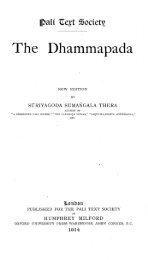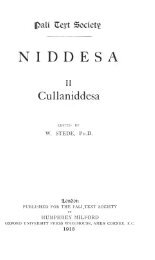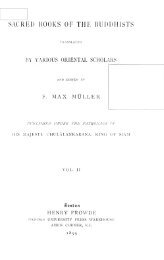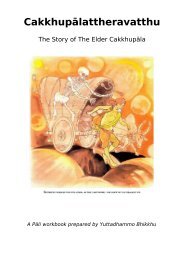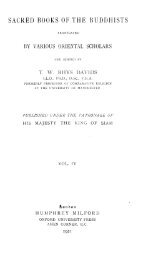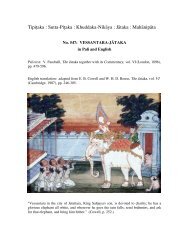Lessons In Practical Buddhism - Sirimangalo.Org
Lessons In Practical Buddhism - Sirimangalo.Org
Lessons In Practical Buddhism - Sirimangalo.Org
You also want an ePaper? Increase the reach of your titles
YUMPU automatically turns print PDFs into web optimized ePapers that Google loves.
outside of the Buddha’s teaching. <strong>In</strong>stead, it is common to<br />
hear of mantras like “God”, “Jesus”, or “Om” – even in<br />
Buddhist circles, it is common to hear people reciting the<br />
Buddha’s name as a mantra to calm the mind. Mantras of<br />
this latter sort tend to have great spiritual meaning for those<br />
who employ them and are meant to bring about special,<br />
super-mundane experiences for the practitioners. The idea<br />
of watching one’s stomach and saying “rising, falling, rising,<br />
falling” seems, therefore, rather mundane and uninspiring to<br />
most people. The truth, however, is that the results that<br />
come from focusing on the mundane are far more profound<br />
than focusing on an external object, since the latter can only<br />
bring calm and concentration, while the former can bring<br />
true and lasting wisdom and understanding about reality. By<br />
focusing on our own mundane experience, the reality of the<br />
body and the mind, we come to understand the whole of the<br />
universe, because we are observing the building blocks of<br />
reality – physical and mental experience – as opposed to that<br />
which is conceptual, like God, the soul, or the Buddha.<br />
The Buddha himself affirmed the truth that the<br />
understanding of the whole universe is to be found within<br />
ourselves, when he said,<br />
“imasmiṃyeva byāmamatte kaḷevare sasaññimhi<br />
samanake lokañca paññapemi lokasamudayañca<br />
lokanirodhañca lokanirodhagāminiñca paṭipadanti”<br />
“Yet, in this mere fathom-long body, endowed with<br />
perceptions, endowed with mind, I declare to exist the<br />
world, the origin of the world, the cessation of the world,<br />
and the path leading to the cessation of the world.”<br />
– SN 2.26<br />
He gave this teaching to an ascetic who had used his<br />
meditative attainments to try to find the end of the universe<br />
through astral travel. The Buddha told him that “gamanena<br />
na pattabbo lokassanto kudācanaṃ” – “the end of the world<br />
is never to be reached by going”. He explained that it is to<br />
be found rather by one who stays still and is internally<br />
composed (samitāvi), since true reality is based on personal<br />
72



